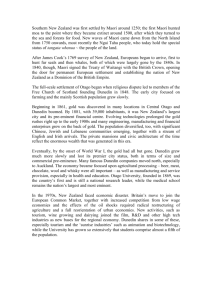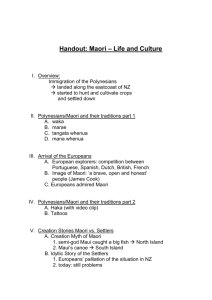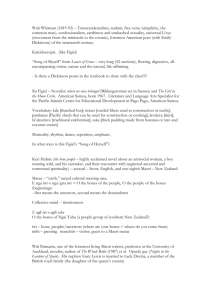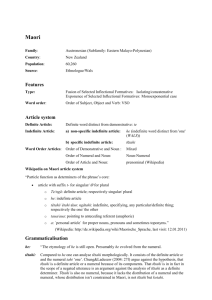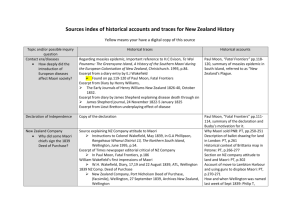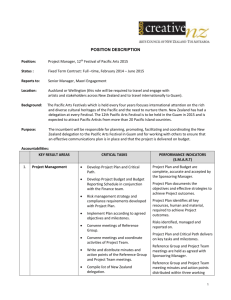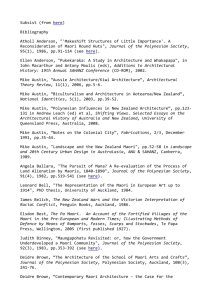CoRE announcement (Royal Society - 060302).
advertisement
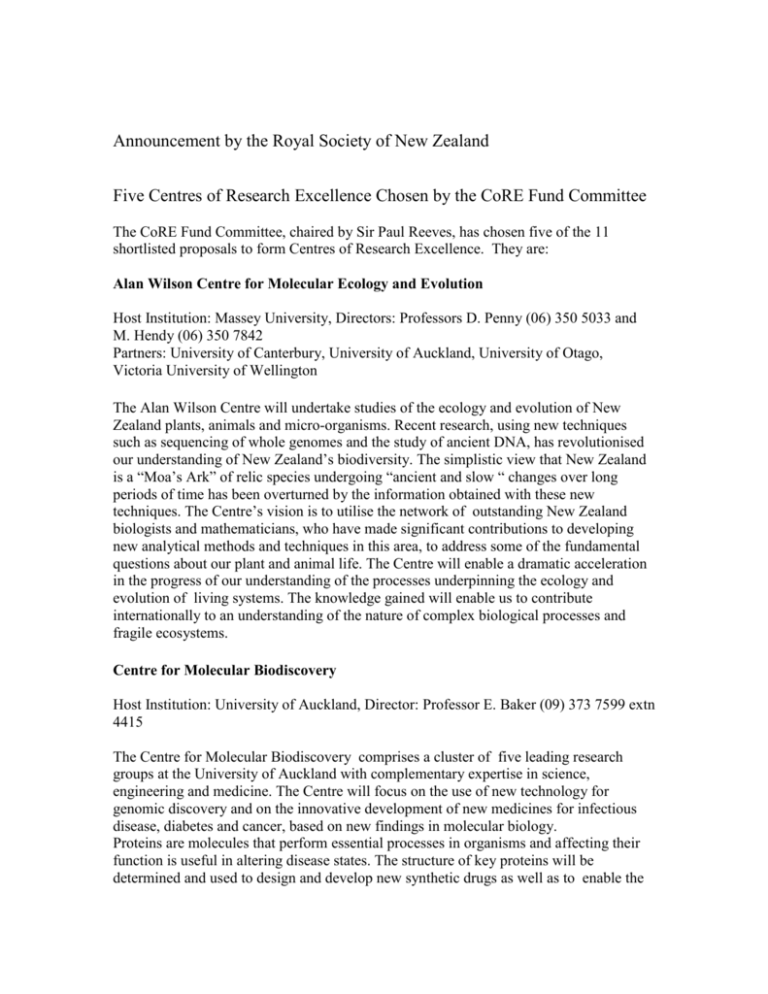
Announcement by the Royal Society of New Zealand Five Centres of Research Excellence Chosen by the CoRE Fund Committee The CoRE Fund Committee, chaired by Sir Paul Reeves, has chosen five of the 11 shortlisted proposals to form Centres of Research Excellence. They are: Alan Wilson Centre for Molecular Ecology and Evolution Host Institution: Massey University, Directors: Professors D. Penny (06) 350 5033 and M. Hendy (06) 350 7842 Partners: University of Canterbury, University of Auckland, University of Otago, Victoria University of Wellington The Alan Wilson Centre will undertake studies of the ecology and evolution of New Zealand plants, animals and micro-organisms. Recent research, using new techniques such as sequencing of whole genomes and the study of ancient DNA, has revolutionised our understanding of New Zealand’s biodiversity. The simplistic view that New Zealand is a “Moa’s Ark” of relic species undergoing “ancient and slow “ changes over long periods of time has been overturned by the information obtained with these new techniques. The Centre’s vision is to utilise the network of outstanding New Zealand biologists and mathematicians, who have made significant contributions to developing new analytical methods and techniques in this area, to address some of the fundamental questions about our plant and animal life. The Centre will enable a dramatic acceleration in the progress of our understanding of the processes underpinning the ecology and evolution of living systems. The knowledge gained will enable us to contribute internationally to an understanding of the nature of complex biological processes and fragile ecosystems. Centre for Molecular Biodiscovery Host Institution: University of Auckland, Director: Professor E. Baker (09) 373 7599 extn 4415 The Centre for Molecular Biodiscovery comprises a cluster of five leading research groups at the University of Auckland with complementary expertise in science, engineering and medicine. The Centre will focus on the use of new technology for genomic discovery and on the innovative development of new medicines for infectious disease, diabetes and cancer, based on new findings in molecular biology. Proteins are molecules that perform essential processes in organisms and affecting their function is useful in altering disease states. The structure of key proteins will be determined and used to design and develop new synthetic drugs as well as to enable the development of models that mimic how they function in cells. The Centre’s links with major pharmaceutical companies ensure the commercialisation of new discoveries and consequent economic benefits to New Zealand. New Zealand Institute of Mathematics and its Applications Host Institution: University of Auckland, Directors: Professors V. Jones and M. Conder (09) 373 7599 extn 8879 Partner: New Zealand Mathematics Research Institute The New Zealand Institute of Mathematics and its Applications will focus on the use of high-level mathematical and computational techniques to problems in medicine, biology, engineering, industry and commerce, with particular emphasis in areas of emerging importance such as bio-engineering, bio-informatics, medical statistics, optimisation and risk assessment. A key activity of the Institute will be the organisation and presentation of six-monthly programmes on themes of significant and contemporary importance such as mathematical biology and its applications. The rest of the science community will contribute suggestions for these themes. The Institute will accelerate the use of mathematics across the spectrum of science and engineering through its research programmes and intensive periods working on particular themes. In an increasingly complex world, the use of mathematical techniques to enhance good decision-making will provide New Zealanders with a competitive advantage. Nga Pae o te Maramatanga (Horizons of Insight) The National Institute of Research Excellence for Maori Development and Advancement Host Institution: University of Auckland, Directors: Professor L. Smith (09) 373 7599 extn 2391, and Associate Professor M. Walker (09) 373 7599 extn 2391 Partners: Te Whare Wananga O Awanuiarangi, Te Wananga O Aotearoa, Victoria University of Wellington, University of Otago, University of Waikato, Landcare Research The National Institute of Research Excellence for Maori Development and Advancement will focus and build on Maori strengths in education, health and science. It plans to bring together Maori and western intellectual traditions and experience to generate new knowledge that will lead to new technologies and significantly improve socio-economic outcomes for Maori. It will achieve this by (1) drawing on Maori and mainstream knowledge and thought to raise standards of research; (2) improving uptake of research through engagement with Maori social structures; and (3) expanding and deepening both Maori and national research capability. The Institute’s planned research programme includes expanding current research activities in (1) new building materials for cheaper, warmer housing; (2) young people’s views of schooling and society; and (3) fundamental studies of the processes underlying diseases, such as diabetes, to which Maori are genetically predisposed. The MacDiarmid Institute for Advanced Materials and Nanotechnology Host Institution: Victoria University of Wellington, Director: Professor P. Callaghan (04) 463 5945 Partners: University of Canterbury, Industrial Research Limited, Institute of Geological and Nuclear Sciences The MacDiarmid Institute will be the centre for innovation and discovery in fundamental and applied materials science and technology in New Zealand. Strong international links coupled with a multi-disciplinary approach will enable the Institute to discover and understand new advanced materials and technologies to create new products, technologies and industries for New Zealand. Materials and technologies currently attracting world-wide attention that will be addressed by the Institute include: nanoengineered materials and devices, opto-electronics, superconductors, conducting polymers, functional materials and coatings, energy storage systems, soft materials, biomaterials and complex fluids. The CoRE Fund Committee was impressed by the diversity of world-class research represented in the proposals and funded the maximum number of centres possible. Each centre will receive additional funding for expenditure on equipment. All of the shortlisted proposals considered by the Committee had been selected by expert panels for their research excellence and their ability to train researchers. The Committee had to decide which proposals would bring the greatest benefits to New Zealand, in terms of economic, environmental and social development. The five centres are hosted by particular institutions but all involve national collaborations of researchers. There has always been collaboration among researchers in different universities and other institutions, but the establishment of centres with dedicated long term funding (up to six years), will enhance this teamwork and stimulate greater research activity. For further information, contact Dr Valda McCann, Manager of Centres of Research Excellence Fund, 04 472 7421, direct line 04 470 5776, or 025 241 2935, email (valda.mccann@rsnz.org).
